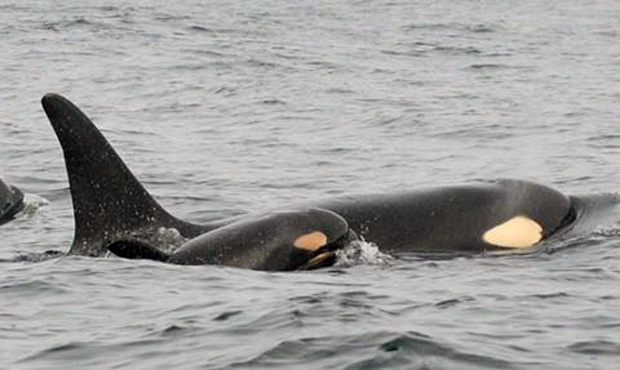Food scarcity could threaten Northwest’s orca baby boom
Dec 11, 2015, 7:14 AM | Updated: 9:55 am

The Center for Whale Research, which is one of the few organizations permitted to get close enough to monitor Northwest killer whales, has reported seven births in just the last year. Of the infant whales, just one is female. (National Oceanic and Atmospheric Administration)
(National Oceanic and Atmospheric Administration)
The Northwest orca population has been going through a baby boom, with seven calves born in just the last year. It’s more than we’ve seen in decades.
To understand why this is a near-miracle for the endangered southern resident orca whales that swim between Puget Sound, Strait of Juan de Fuca, and the Pacific Ocean, it’s important to understand how hard it is for calves to survive past infancy.
Pregnant mother orcas have more than a 50 percent chance of miscarriage, according to new research from the University of Washington. Even if a calf comes to term and is born healthy, only half of them survive their first year.
Related: The Puget Sound welcomes a new baby orca
It all boils down to how much food they can find, which, for years, has been scarce.
However, Dr. Deborah Giles, director of the Center for Whale Research, says the whales hit the jackpot.
“In 2013, when those calves were conceived, the whales were not in the inland waters like they normally would have been,” she said. “So, where were they? Presumably they were out in the open ocean, foraging, and they were in an area that had enough food to have enough of the groups together that they were mating. Apparently, like crazy.”
Dr. Giles says her researchers are one of the few allowed to get up close and observe the calves, which look like they are thriving so far.
“They’re just the cutest things – I mean, all babies are cute,” Giles said. “Baby killer whales are cuter than most babies.”
But there’s a catch. These newborn whales might not survive too long.
“The scary thing is going to happen in the next [two to five years],” she said. “Because we know from – for example this drought, with so many hundreds of thousands of fish dying in-river, not being able to spawn, and small juveniles not being able to get out of the river system – we’re looking at a potential crash in the southern resident killer whale prey.”
Not enough fish — it’s a struggle the whales have faced for decades. Besides just the scarcity of food, whales are also subject to health risks because of bio-accumulated toxins, according to Giles. These toxins, which include heavy metals such as mercury, are in the salmon orcas eat. Salmon, in turn, ingest plankton, which also have toxins from living in polluted ocean environments.
These toxins latch onto whale fat. So, if orcas have enough fish to build up fat, they can stay healthy.
Killer whale calves have an added challenge: mother whales pass their fat reserves and toxins on to their babies during pregnancy, according to Giles. That means young whales have even higher health risks, which partly accounts for their extremely high infant mortality rate.
Dr. Giles says lack of fish has also broken up what once were big pods into small family units that spend less and less time in Puget Sound. They roam much farther into the Pacific to find food and it’s created fewer opportunities for groups to mix and mate.
Dr. Giles says without more fish, every new calf born in the last year could be in trouble. Hatchery fish can help in the short-term, but Dr. Giles says they aren’t genetically diverse nor hardy enough to rebuild natural populations.
According to Dr. Giles, the long-term solution is proving to be controversial.
“So there are four dams on the Snake River that the science is really coming back showing that to remove those dams would be 70 percent of the needed food for these southern residents,” Giles said. “It would open up 5,500 miles of spawning habitat for wild Chinook salmon.”
There is hope for the next generation of orcas. The whales could stumble on another food-rich area in the Pacific when the salmon supply gets low in Puget Sound. If they do, it could be just enough to keep them going until the effects of this year’s drought are over, and more salmon return to Puget Sound.













